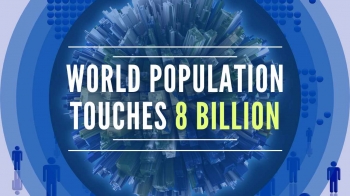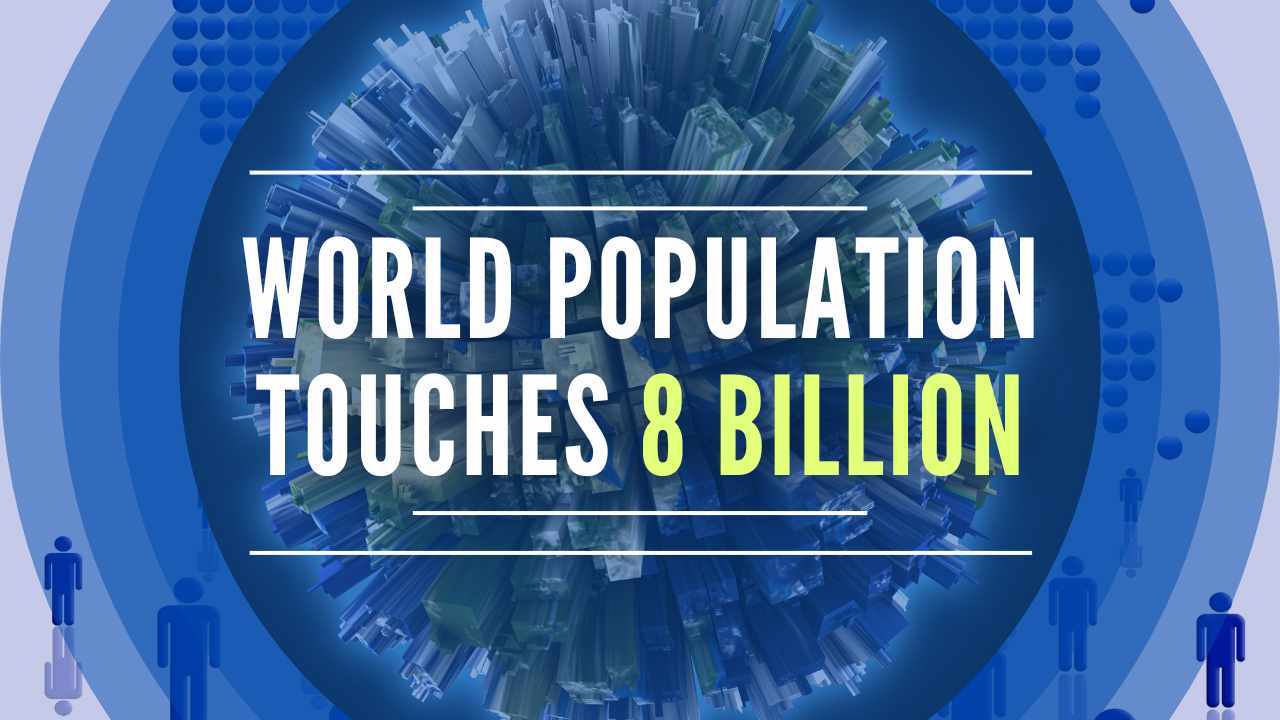
.jpg) J. Prasant Palakkappillil
J. Prasant Palakkappillil

“Eight Billion and Counting: How Sex, Death, and Migration Shape Our World” is the title of a book written by Jennifer Sciuba, political demography expert from Rhodes College, published early this year. And the world saw the birth of the eight billionth child on November 15, 2022. The phenomenon is much greater -- overwhelming, mind-boggling!
It is another milestone in the Anthropocene, with the anthropos spreading over the planet hitting the startling number of 8 billion (8 followed by 9 zeroes). Venice Mabansag, born through normal delivery at Dr. Jose Fabella Memorial Hospital, Manila, at 1.29 am is reported to be the 8 billionth child. Is it a time to celebrate the indomitable human spirit or a time to lament, correct, or a time to assess, plan and collaborate for a stable, better and peaceful world?
In 11 to 12 years, the human species are able to add one more billion to their numbers, while simultaneously managing to displace millions of other species from the planet; it is not to create space to accommodate these added millions, but it is because a handful of the homo sapiens have been able to erect their own kingdoms of indulgence and luxury at the expense of these disappearing millions.
Scuiba is arguing for more and deeper research in the field, which I fully concur with. She says what is good about this field is that we definitely can foresee future to some extent, in the sense today's working youngsters would be the future aging group, and today's toddlers will be the future working group. With that certainty in hand, and with the possible projections in the field of health care and longevity, much can be planned.
She also perceives that the vast divergence across continents and nations in population dynamics -- fertility, mortality and migration -- tend to be converging; and gap is getting reduced. So, the doomsday predictions, especially relating to migration trends, needn't be all that realistic, and though migration on account of push factors (poverty, climate change etc.) will continue to happen, it wouldn't be to the extent of displacing or swallowing up populations altogether.
India in Focus
Turning to the Indian sub-continent, the country is all set to overtake China in another year or so, to be the most populous nation of the world. People get worried less for themselves, more for the future and wellbeing of humanity. There are some who worry for life beyond the humans on the planet as well.
It would be interesting to trace the growth in world population. In 1850 it was 1.2 billion; another 50 years, into 20th century, it was still just 1.6 billion; and it was in 1927 that humanity crossed the 2-billion mark. Since then, there had been no turning back, initially slow -- reaching 3 billion by 1960, then picking up pace steadily 4 billion in 1974, 5 in 1987, 6 in 1999 and 7 in 2011. The projections see 10 billion people by 2058.
In the last 11 years, the world has added another billion.
The child from the neighbouring Bangladesh, who was selected as the 7 billionth child, Sadia Sultana Oishee, was on the BBC as the human population is said to have hit the 8-billion mark. Now 11 years old, she has a star status, though still leading an ordinary girl's life in the outskirts of Dhaka to make life more affordable against the price induced by the pandemic. She dreams big to be a doctor, and the family is supportive. But Sadia's country, Bangladesh has contributed 17 million of this one billion; where as its big brother around, India, has added 160 million. However, it showed a steady decline in the rate of this increase from 1.37% in 2011 to 0.68% in 2022. Plan International gave the certificate of being the 7 billionth person on the planet to Nargis Kumar, UP, as a token of protest against the trend of sex-selective abortion in the state, with India having a boy-girl ratio of 914, while in the state of UP it remains a shocking 889.
Can the earth carry so many? The 6 billionth child, now 23-year-old Adnan Mevic of Bosnia-Herzegovina, one of the most rapidly declining populations, is also worried: 2 billion (increase) is a lot... I don't know how our beautiful planet will cope with. It is a worrying question before the few who are concerned. Pope Francis cited the extreme positions people tend to take in this regard in his encyclical Laudato Si: that of projecting unlimited progress potential and technological solutions for everything and that of a pessimistic view of the human role as the cause of all damage to the ecological balance, and hence their very presence on the planet to be reduced (LS 60).
India has to re-establish itself as a leader by creating a hunger and poverty-free world, beginning with itself. This is not at all impossible, but is only a matter of priority. Besides, it has to take along with it, the three neighbours in the LDC list -- Bangladesh, Bhutan and Nepal -- in its drive towards a world free of hunger and poverty.
Sustainability -- Planet and People
The UN population projections show a slower growth rate, but overall continued growth for more than a century from now. As per these trends, by 2100 the world is expected to be home for 11.2 billion of homo sapiens, and the axiom of 'responsible consumption and production' has to be an outcome of all sorts of education, viz., formal education, family and social education, religious education. There has to be a multi-pronged global endeavour to sustain the planet for future generations, where a dignified life for all (beings) would be possible.
The stark reality that earth’s resources do not increase and are limited becomes clearer; but there is also the fact that of the food produced globally a third or more is lost or destroyed; whereas technology and a fairer distribution can still make the world's hungry poor satisfied, not in another world, but in this world itself (LS 60).
There is also the data that points to reduction in the rate of population growth as a nation advances in literacy and technology, with quite a few nations having growth rate that goes below the required rate for replacement of successive generations (2.1 births per woman) -- Europe in general, and 10 of the most populous nations, including China come under this category. But this is countered by the trend in 47 of the least developed countries (LDC) maintaining a birth rate of 4.3 per woman. (However, there are some paradoxes as well – Senegal, one of the LDCs, is capable of fielding a team for the world cup 2022; Bhutan, another, is often referred to as the country with highest gross happiness index).
While population control measures are the most popular and perhaps effective initiatives so far, the stand of the Church has been of responsible parenthood (Pope Paul VI, 1968. Humanae Vitae), which would imply life-styles that promote life and respect it, and advocates these principles to guide natural and rightful human sexual and reproductive relations. I would consider it on parallel lines with the modern day secular sustainable development goal of 'responsible consumption and production'.
And, looking at trends, I am just being optimistic, that many parts of the world would require people from the rest of the world to keep them alive, working and producing. Signals in this direction are already seen from countries like Japan. So that is again an optimistic, perhaps, naive way of looking forward to 'where the whole world will become one nest' - yatra sarva vishwam bhavati eka nidam.